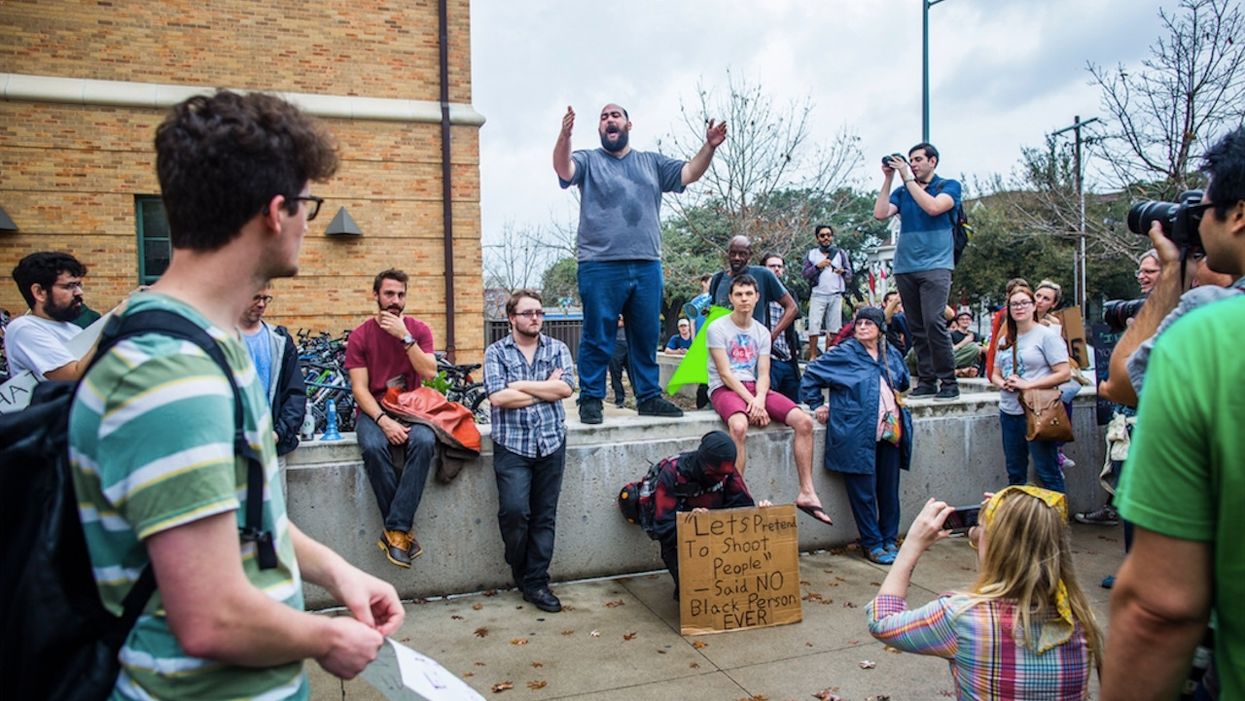
Photo by Drew Anthony Smith/Getty Images

'Students deserve to be able to express themselves and voice their opinions without fear of investigation or punishment'
The University of Texas at Austin prohibits and can punish students for a wide range of speech violations, including infractions defined as "ridicule" and "insults" — not to mention electronic communication deemed "rude" and "uncivil," according to a federal lawsuit filed Thursday.
Speech First — a nonprofit that combats restrictions against free speech and civil rights at the collegiate level — filed the suit in U.S. District Court for the Western District of Texas, saying UT has "created an elaborate investigatory and disciplinary apparatus to suppress, punish, and deter speech" without adequately defining what students cannot say, which has had a chilling effect on First Amendment protections at the publicly funded college of 40,000 undergraduates.
"What's rude to me might not be rude to you," Speech First President Nicole Neily told TheBlaze on Friday, adding that the "discretion given to campus administrators" to make such judgments is "tremendously concerning."
Sanctions for violating some policies range from warnings to suspensions and even criminal prosecution, the lawsuit said.
The lawsuit said "verbal harassment" at UT is defined as "hostile or offensive speech" that "is sufficiently severe, pervasive, or persistent to create an objectively hostile environment that interferes with or diminishes the victim's ability to participate in or benefit from the services, activities, or privileges provided by the University." And it "may consist of threats, insults, epithets, ridicule, personal attacks, or ...harassing sexual speech ..."
Verbal harassment also is covered in UT's nondiscrimination policy, the suit said, and includes "insults, epithets, ridicule, [and] personal attacks" that are "based on the victim's ... personal characteristics, or group membership, including but not limited to... ideology, political views, or political affiliation." Violators are subject to university discipline, the suit added.
Acceptable behavior within the confines of electronic communication at UT is covered under the school's "acceptable use" policy, the lawsuit said, and prohibits emails and other electronic communication defined as "rude" or "uncivil."
And students who violate the policy can get verbal warnings, revocation of access privileges, disciplinary probation, suspension, and even criminal prosecution, the lawsuit said.
The Residence Hall Manual under "Incivility" states that "students are expected to behave in a civil manner that is respectful of their community and does not disrupt academic or residential activity. Uncivil behaviors and language that interfere with the privacy, health, welfare, individuality, or safety of other persons are not permitted," the suit said.
More from Speech First:
More than 100 reports of alleged "expressions of bias"—through posters, fliers, social media, whiteboards, verbal comments, classroom behavior, etc.—have been investigated by the university's bias response team since September 2017. According to UT, examples of bias incidents may include "somebody … creat[ing] a hostile or offensive classroom environment," "[d]erogatory comments made on a … course Facebook page," "[h]ostile and insensitive treatment in interaction with a campus department/unit," and "[s]tudent organizations participating in traditions perceived as insensitive or based on stereotypes[.]"
In light of these policies, Speech First members enrolled at Texas have abstained from speaking on topics including immigration, identity politics, and abortion because they fear their speech will be anonymously reported as derogatory, hostile, and/or offensive to university authorities through the Campus Climate Response Team. The complaint alleges that these hopelessly vague policies chill student speech and expression – a clear First Amendment violation.
"Without a doubt, the University of Texas has failed to appropriately safeguard students' First Amendment rights," Neily added. "Students deserve to be able to express themselves and voice their opinions without fear of investigation or punishment – which is why these policies must be reformed."
Speech First asked the court to declare that UT's speech codes are unconstitutional and for a permanent injunction barring the school from using its Campus Climate Response Team to "investigate, threaten, or punish students."
UPDATE 3:36 p.m. ET: A UT official on Friday told TheBlaze the school is "in the process of reviewing the lawsuit. At first glance, it appears to be incomplete on certain facts. We look forward to reviewing it and responding through legal channels."
"The university's policies vigorously protect students' First Amendment rights," J.B. Bird, UT's director of media relations, added to TheBlaze in a statement. "The University of Texas at Austin strongly values and protects free speech, and all students, faculty and staff have the right of free speech and expression on the UT Austin campus. As stated in the university's Handbook of Operating Procedures:
"The freedoms of speech, expression, and assembly are fundamental rights of all persons and are central to the mission of the University. Students [at UT Austin] ... have the right to assemble, to speak, and to attempt to attract the attention of others, and corresponding rights to hear the speech of others when they choose to listen, and to ignore the speech of others when they choose not to listen."
This story has been updated with a statement from the University of Texas at Austin.